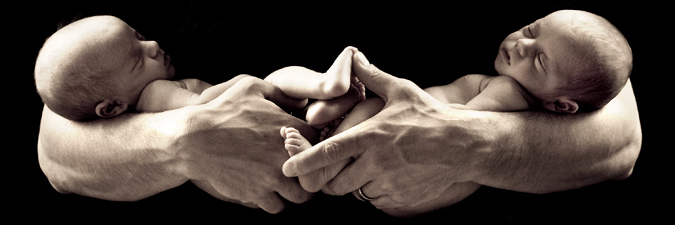Why do some receive Jesus and others reject him? Is it determined by environmental influences? Is it determined by one’s morality? In Romans 9:6-13, Paul argues that parentage and personal record do not determine who becomes a child of promise.
In this post, we’ll look at verses 10-13. For a discussion of verses 6-9, click here.
Parentage
And not only so, but also when Rebekah had conceived children by one man, our forefather Isaac… she was told, “The older will serve the younger.” As it is written, “Jacob I loved, but Esau I hated.” (Rom 9:10, 12-13)
Paul quotes from Genesis 25 and Malachi 1. His point is that Jacob and Esau shared a father, a mother, and a womb (they were twins); yet one was chosen and the other rejected. God’s work in the lives of people is not based on parentage or the environment into which one is born.
Personal Record
…though they were not yet born and had done nothing either good or bad… she was told, “The older will serve the younger.” As it is written, “Jacob I loved, but Esau I hated.” (Rom 9:11a, 12-13)
Having established that parentage/environment does not determine who is chosen, Paul drives the point deeper. Personal record doesn’t determine it either.
An important question to ask at this point is this: Did God predict that one would be stronger/loved and the other weaker/hated? Or did God determine that one would be stronger/loved and the other weaker/hated? Some clues:
1. Paul’s larger point is that God is doing something very intentional in bringing about his promise through some people and not others.
2. Paul’s next thought (verse 14) is to question God’s justness. Why would God’s justness be in question if he was only predicting people’s fate? It would make more sense to question his justness if Paul had just said that God determines people’s fate.
3. Paul goes on to state that God has mercy on whom he has mercy and hardens whom he hardens (verse 18).
Who becomes a child of promise? One cannot be physically born into it. One cannot work his way into it with good deeds. One must be chosen by God. And God’s choice is his.
Purpose of God
…in order that God’s purpose of election might continue, not because of works but because of him who calls- she was told, “The older will serve the younger.” As it is written, “Jacob I loved, but Esau I hated.” (Rom 9:11b-13)
What does Paul mean by God’s purpose of election? Purpose means predetermined plan. Election means selection, choosing some from many for some specific outcome.
John Piper offers som helpful insight about the original construction of this phrase. It is set up the same as the phrase natural branches in Romans 11:21. In the original language these phrases look like this: the according to nature branches and the according to election purpose. As the branches are brought about by and characterized by naturalness, so God’s purpose is brought about by and characterized by election.
This means that election (God’s choosing of some and not others) is central to his purpose, which means that it is central to reality itself; because God’s purpose is the purpose that will stand, while the many purposes of man will come to an end one day.
Ephesians 1:3-14 seems to support this conclusion. In this passage Paul states that God predestined Christians for adoption according to the purpose of his will. This purpose is mysterious and it is set forth most clearly in Christ. Most tellingly, Paul states in verse 11 that all this is worked according to the counsel of his will. When I have big decisions to make, I seek counsel from a number of people who are wiser and more experienced than I. God doesn’t do this. His will is all the counsel he needs. In other words, God’s complete, unrestricted freedom to choose who will be a child of promise and who will not is central to what it means to be God.
____
There will be at least two follow-up posts regarding this passage. One will tackle the problematic verse 13 specifically. The other will include several broader observations based on this passage and what it means regarding free will and God’s character.






